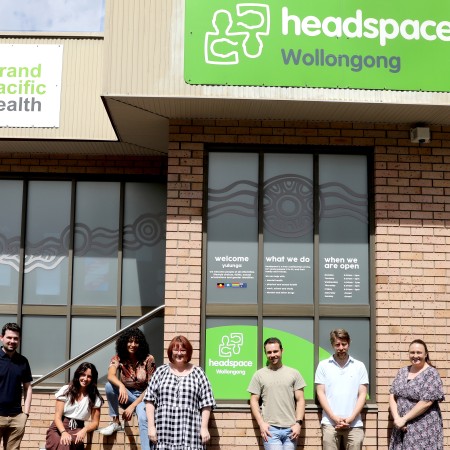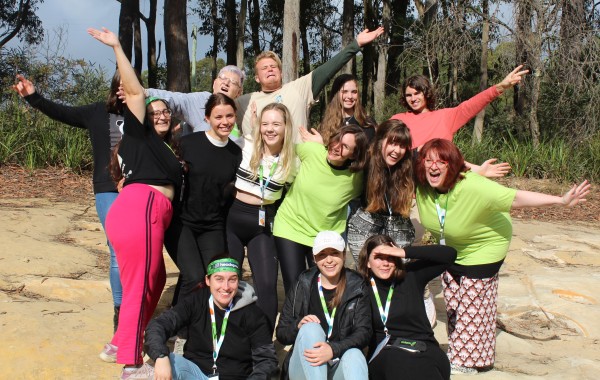headspace
Wollongong
-
7 Atchison St, Wollongong, New South Wales 2500
-
Phone (02) 4220 7660
-
Fax (02) 4225 0057
-
info@headspacewollongong.org.au
-
About
headspace Wollongong is a free mental health service for young people aged 12-25.
We offer support in person, as well as telehealth appointments.
If you have any concerns, please call on 42207660.
Please do not attend in person if you have been unwell, or if you are awaiting a COVID test. Give us a call to discuss alternate ways we can care for you.
If you are in an emergency situation or need immediate assistance: call 000
If you need urgent support call:
- Mental Health Line: 1800 011 511
- Lifeline: 13 11 14
- Kids Helpline: 1800 551 800
- Suicide Call Back Service: 1300 659 467
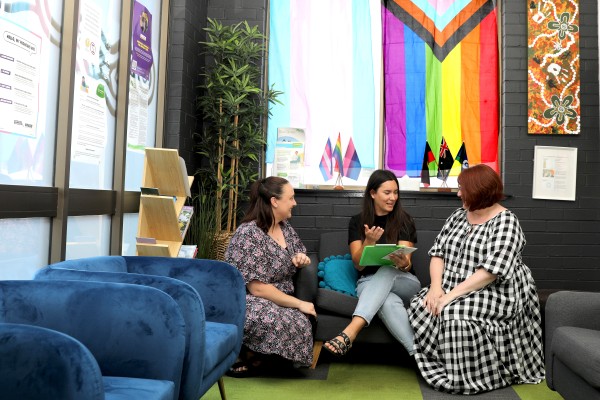
Hours
- Monday: 8:30am - 5:00pm
- Tuesday: 8:30am - 5:00pm
- Wednesday: 8:30am - 6:30pm
- Thursday: 8:30am - 5:00pm
- Friday: 8:30am - 5:00pm
- Saturday: Closed
- Sunday: Closed
headspace Wollongong is operated by Grand Pacific Health Ltd. All headspace services are funded by the Australian Government Department of Health and Aged Care. Administration of funding is carried out by the headspace centre’s local Primary Health Network, in this case, South Eastern NSW (Coordinare Ltd).
Services
Get tips on how to prepare your resume and present for interviews. Find out about local employment opportunities (full time, part-time, or casual).
GPs can help with any physical health issues as well as issues related to sexual health, drug or alcohol use, relationship problems or feeling down or upset. Your centre may have a GP on site or links to one locally.
Workers either on site or linked to the centre who can assist you with any alcohol or other drug concern.
Centres have a range of programs and activities for young people. Just ask your centre what they have on.
Mental health workers – which may include psychologists, psychiatrists, counsellors and other workers – that can help if you're just not feeling yourself.
Sexual health screenings on site or links to local services.
A group of young people who help with events and some decision making at a centre. Ask your centre about getting involved.
More information
If you ever need to turn to headspace Wollongong for some help and support, there are a number of friendly staff members you may come in contact with.
To support and lead the team at headspace Wollongong…
- Service Manager Mon, Wed-Friday – Georgia she/her gdeane-smith@gph.org.au
Service Manager Tue, Thu - Dedar she/her dabdula@gph.org.au - Senior Administration – Jacqui she/her
- Clinical Lead – Cherise she/her
Our friendly reception and administration staff…
- Jacqui she/her
- Rebecca she/her
- Maddie she/her
You might need to make a Doctor’s (GP) appointment for check-up or to get a Mental Health Treatment Plan. We have both male and female GP’s available…
- Dr. John he/him (Monday and Thursday)
- Dr. Lisa Brown she/her (Tuesday)
If you’re contacting headspace Wollongong for some mental health support, the first step is to participate in a brief phone chat. This is called ‘intake’ and it’s where we are able to determine what kind of support you need. During this call, you’ll be most likely chatting with…
- Senior Intake Clinician - Sammy she/her
After this, you might like to make an appointment to come in and speak to someone face-to-face. At headspace Wollongong, we have friendly, skilled and professional staff who can offer services for a range of needs...
- Psychiatrist – Dr Muul he/him
- Youth Access Clinician - Jess she/her
- Mental Health Clinicians and Contractors
- Natasha she/her
- Emily she/her
- Brianna she/her
- Stacey she/her
- Holly she/her
Other services we offer at headspace Wollongong…
- Work and Study support - Mat he/him (please note you must be linked with a clinician within headspace Wollongong before you can access work and study support)
- Youth Care Coordination - Bridget (She/Her)
- Peer work - Meg she/her
If you want to contact us to organise a school presentation, program or community event to help engage our community by increasing mental health literacy and help-seeking practices…
- Community Engagement – currently hiring watch this space!
If you are in need of a check-up, or if you need to get a mental health treatment plan, the GP's at headspace Wollongong can help. Our youth friendly GP’s can also help you with:
- General and physical health
- Mental health and wellbeing
- Sexual health
- Alcohol and other drugs
- Preventative health
Our GP services will be bulk billed (which means you don't have to pay!), so bring your Medicare card when you visit.
More information about how to get a Medicare card.
For a visit to one of our GP’s, simply make an appointment at headspace Wollongong reception or call (02) 4220 7600.
- Dr. Lisa Brown can see you on Tuesdays
- Dr. John Watson can see you on Mondays and Thursdays
headspace Wollongong is not an acute or crisis mental health service. If you (or a young person you are supporting) is in need of immediate support, please call the Mental Health Line (1800 011 511), Lifeline (13 11 14) or Kids Helpline (1800 55 1800). In an emergency, contact 000 immediately.
For young people and their families:
Contact headspace Wollongong on 4220 7660 or info@headspacewollongong.org.au to make an appointment.
If you're making an appointment for a family member or a friend, please note that the young person needs to be aware of and consent to the referral and be willing to meet with a member from the headspace Wollongong team.
For professionals:
GPs, Allied Health Professionals, community-based agencies and educational institutions can all assist in referring young people to headspace Wollongong, so long as the young person is present to consent to the referral being made.
If you are a GP or service provider, Click this link to refer a young person to our service.
General Practitioners should include a Mental Health Care Plan (if appropriate) for the young person.
If you are unable to access the digital form, download the PDF below then email or fax using the contact details below.
GP Service Provider Referral Form
Fax 4225 0057
Email info@headspacewollongong.org.au
General
◯ Water is available at reception.
◯ Each room has comfortable seating.
◯ Rooms are air-conditioned/heated.
Wheelchair users
◯ We have one car space for wheelchair users, otherwise there is 2hr paid street parking on surrounding streets.
◯ We have a wheelchair lift to access the building. Please call reception upon arrival to assist you with operating the lift.
◯ Our toilet is wheelchair accessible, however, the door is not a sliding door. Ask reception if you require assistance.
◯ All internal doorways are wide enough for wheelchair access and flooring is kept clear.
This is your headspace welcome pack. We’ve created this pack to introduce you to our service and direct you to where you can find further information and supports.
Here is a virtual tour of our centre - check out what it's like to come to headspace Wollongong for support.
Where to look for support while you're on waiting list at headspace Wollongong
Waiting for your psychology, counselling or psychiatry appointment can take a long time.
If you've made it to this web page, chances are you've probably looked for support online already.
Here are some of our suggestions that you can use while you wait:
Have a look at our wellbeing starter pack – it is a collection of a few useful apps, services and resources you can turn to if you're looking for support while you wait.
Did you know headspace is also online not just at a centre?
You can get free online and telephone support and counselling for your mental health by creating a headspace account. There are group chats, online communities, and 1:1 direct support with eheadspace professionals. It also has support for your families and friends. Visit online and phone support or call 1800 650 890
If you don’t feel comfortable talking to anyone you know, you might feel better calling a helpline, joining a forum discussion or trying an online program.
The Beyond Blue forums are a supportive place to connect with people who are going through similar experiences to you. You can read other people’s stories, ask for advice or share your own experience.
Reach Out Forums is a supportive, safe and anonymous space where people care about what's happening for you, because they've been there too.
The website has information and services to support young people through any problems – big or small.
Children of Parents with a Mental Illness (COPMI)
Having a parent with a mental illness can be tough. But COPMI have a lot of information and videos to help you get your head around it all.
Don’t forget Your School:
It can be scary telling people that you are struggling but talking to your school can really help you. Chances are you aren't the only student who is struggling with their mental health, and the school probably already has some kind of internal support system. Speak to a teacher you trust, and they should be able to help you.
Other Youth Services in our region:
Your local council runs youth programs and has supports available for young people through dedicated youth centres and from qualified youth workers. Find more details about services offered by:
Shellharbour Youth Services (Blackbutt)
Sentral Youth Services (Kiama)
Parking: There is timed on-street parking available on Atchison Street and surrounding streets. For more information on parking in Wollongong City Centre please click here>>https://www.wollongong.nsw.gov.au/about/parking-transport/parking-in-the-city-centre
Public transport: We're a short walk from Wollongong train station and the free bus (Crown St bus stops). Plan your trip here.
If you are 15 years or older, you can apply to have your own Medicare card. Here’s what to do...
You will need to fill out the form called Application to copy or transfer from one Medicare card to another and bring two forms of identification with you (like a birth certificate, student card with photo ID, health care card, driver's licence, passport, or a bank statement if it has your current adress on it). The form is available online or from a Medicare office.
You will be applying to transfer to a new Medicare card (i.e. to be moved from the card you are now listed on to another new card of your own).
Alternatively, you can also choose to stay on your parents'/guardians' card and have a copy made to keep with you.
You will need the number of the Medicare card you are currently listed on to complete the form. This is most probably your parents’ or guardians’ Medicare card.
Take your original identification and your application form to your nearest Medicare office.
- Wollongong: 43 Burelli Street
- Warrawong: 43-65 Cowper Street
- Shellharbour: Lake Entrance Road
Once you have lodged your application for a Medicare card at a Medicare office, your own card with your own number will be sent to you. If you would prefer, you can make arrangements with Medicare to pick up your card at the office.
headspace Wollongong, Nowra, Bega, Goulburn, Canberra and Tuggeranong now offer telehealth sessions via a special platform called “Attend Anywhere”. We think it gives you the experience most like your normal face-to-face sessions with a clinician. It’s encryption levels mean your conversations stay private, and it allows you to wait in a “waiting room”, under the supervision of our admin team, until your clinician is ready to see you.
WHAT DO I NEED?
- A good connection to the internet. If you can watch a video online (e.g. YouTube) you can make a video call
- One of the following browsers:
Google Chrome web browser on a desktop or laptop, or on an Android tablet or smartphone
Safari web browser on an Apple iMac, MacBook, iPad or iPhone
- Web-camera, speakers, and microphone already built into laptops or mobile devices
How much internet data will I use?
You don’t use any data while waiting for a clinician to join you.
An Attend Anywhere video call uses a similar amount of data to Skype® or FaceTime®.
PRIVACY
You have your own private video room that only authorised clinicians can enter. Video calls are secure; your privacy is protected.
Your telehealth service will not be recorded by us. We ask you to also agree not to make recordings of our sessions and not to use materials from our sessions elsewhere.
WHAT IF I HAVE QUESTIONS?
Your clinician is available to answer all your questions and answer any concerns. Together, you will work out a plan that best suits you. If you wish to speak to someone else about your experience, please call your local headspace centre and ask to speak to the centre manager.
HOW DO I USE ATTEND ANYWHERE?
- Go to the Telehealth Online Video Conference website a little before the prearranged time for your appointment and select the headspace waiting room (red armchair logo).
- On this web page, click Start video call button and follow the instructions
- Wait in your own private video room
- Your clinician sees you arrive in the waiting area and joins you in your video room when they are ready
If you would like to know more, here’s a short video: https://youtu.be/o-64JK4nLuE
WHAT IF MY CONNECTION DROPS OUT?
- If you lose connection, firstly, wait 30 seconds and try to reconnect using the Refresh button.
- If your video link drops out, or if you intentionally disconnect the videoconference, or leave the room where the videoconference hardware is set up, we will immediately contact you via your nominated contact number. If we cannot contact you, then we will activate your Contingency Plan.
What is my Contingency Plan?
At your first session, you and your clinician will work out a telehealth safety plan. This will be reviewed at the beginning of each session. Your plan will include nominated emergency contacts and/or local and emergency services.
HOW DO I PREPARE FOR MY SESSION?
It can be easy to think of your Telehealth session as a less formal “catch-up” and think it doesn’t need much preparation. To get the best from your session, try to:
1) Find a quiet space. Put away your pets, find a room where you think you won’t be overheard. Try using headphones with an in-built microphones, if you can. Most mobile phones come with these.
2) Bring a notepad and pen. Your clinician won’t be able to give you a piece of paper to take home with you so you might need to jot some things down.
3) Have your phone close to you but turn it onto silent and close your email programs. It is important that your clinician can call you, if something should happen to your Telehealth connection, but it’s also important to try to minimise distractions.
4) Give yourself permission to focus. In these busy times there are lots of things calling for our attention. Give yourself permission to be fully present with your clinician for your session.
5) Your telehealth session with your clinician will not take any longer than an in-person session at our centre would, except you don’t have to spend time travelling to us.
headspace Wollongong covers a geographic area from Helensburgh in the north to Windang in the south. We receive a large number of requests from the community, yet we have very limited resources. Therefore, we must prioritise requests according to the areas of greatest need, staff availability, demand and fair and equitable coverage of the local community.
Priority is given to the following local organisations:
- Youth organisations supporting our priority groups;
- Aboriginal and Torres Strait Islander young people
- Culturally and Linguistically Diverse young people
- Gender and sexually diverse young people
- Young men
- Community organisations, charities and not-for-profits with a youth and/or mental health focus
- Schools & education providers (eg. TAFE, University)
- Our partner organisations
- Family & Carer support organisations
Requests from other types of organisations will be considered on a case-by-case basis.
We are unfortunately not able to fulfil all requests. Allowing at least 10 weeks notice will increase the likelihood of us being able to fulfil your request.
Depending on what type of organisation you are, our community activities are mostly free. Some requests may incur a fee to cover part or all of our costs due to the nature of the activity (for example, requests from commercial organisations, weekend and evening requests, specialised content etc).
Once you have submitted your email our team will review the request and aim to respond within 10 working days.
To request a presentation, please email info@headspacewollongong.org.au with as many details as possible.
If you are looking for some resources to use with young people focusing on mental health and wellbeing, try our 7 tips for a healthy headspace drop down item, for downloadable resources.
At headspace Wollongong we have a number of programs to support gender and sexually diverse young people and their families. For more information about any of our programs, please contact the centre.
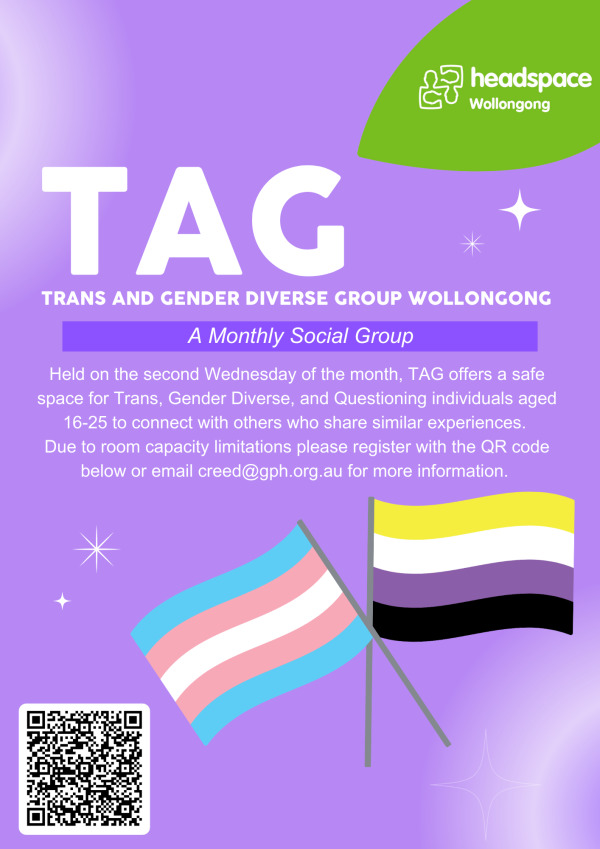
The Binder Collective is a donation-based initiative, running out of headspace Wollongong to enable local trans and gender-diverse young people to access to gender-affirming binders at no cost.
How to access
If you are in need of a new binder or want to try one out to see if binding is something that gives you gender euphoria then you can access the QR code or you can email us at headspace@gph.org.au to put your name down to be contacted when we have a donation in your size. Each binder comes with some care instructions and an information sheet on how to bind safely. We are able to offer binders to young people aged 14-25, and 12-13 with parental consent.
How to donate
If you are interested in donating a binder you no longer need, please contact headspace Wollongong on 4220 7660 to arrange an appropriate time to drop off your donation.
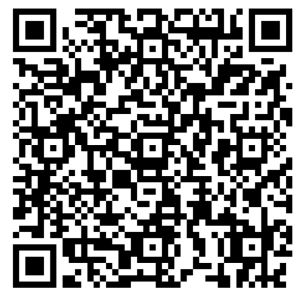
Or fill out an expression of interest form
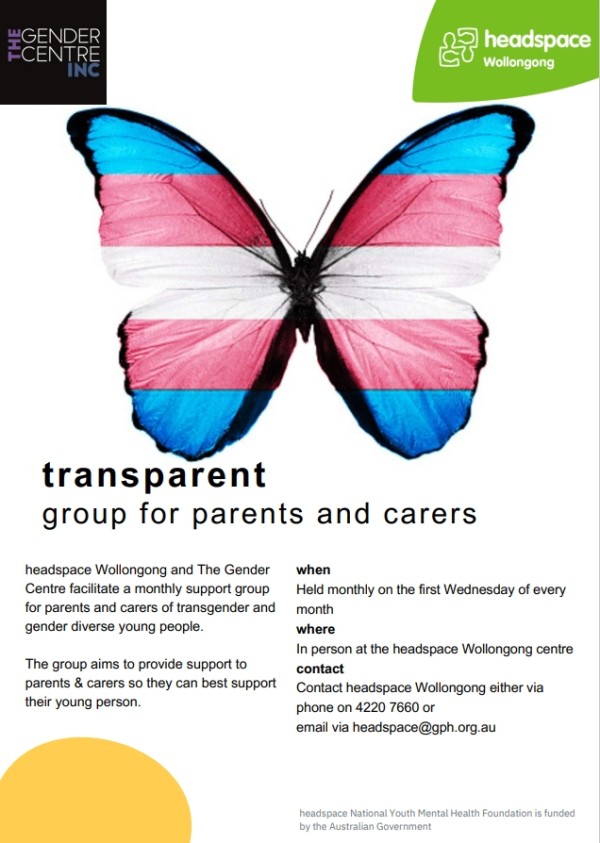
Good mental health and wellbeing allows you to live your life in a positive and meaningful way and cope with life’s changes and challenges. Having good mental health is a state of wellbeing where you feel able to work and study, feel connected to others, be involved in activities in your community and ‘bounce back’ when life’s changes and challenges come along.
How can you boost your mental health?
headspace have developed 7 tips to keep good mental health: you can click on each of the strategies to download helpful information and advice. The worksheet link provides a resource for young people to develop a personalized plan.
The activities you make time for have a big impact on your headspace. When you spend time doing things you enjoy (or used to enjoy), it can give you relief from hard times, and build some fun in your life. Likewise, when you set and achieve small tasks that are important to you (such as completing homework or giving back to your community) it can help to create a sense of accomplishment and meaning.
In a nutshell, doing ‘stuff’ matters. Yet, if you’re going through a difficult time, doing anything can seem like a lot of effort. And if you’re feeling low you may lose interest in things you once enjoyed.
So, what should you do? The key is to focus on doing – even if you don’t want to or feel like it. As you set and achieve even small tasks you will learn more about yourself, build confidence and improve your wellbeing.
2. Learn skills for tough times.
There’s no doubt about it, life can be hard sometimes. From relationship issues, to work and study stress, to days when we don’t feel great – we all go through stressful and emotional periods.
When that happens our coping strategies kick in – these are things that we’ve learnt over time that help us feel better. Some people naturally use ways of coping that are helpful – like journalling, meditation or speaking with friends. But for some of us, the way we cope can leave us feeling worse in the long term. We may stop doing things we enjoy, use alcohol and other drugs or disconnect from friends and family.
So, where should you start if you want to learn new ways to cope with difficult times? The important first step is to reflect on how you react to stress – taking time to understand what you do and why you do it. This builds your self-awareness. It can help you learn things about yourself that will help you handle tough times in the future. The more you understand yourself, the better you will be at applying more helpful strategies that work for you.
Healthy relationships are super important for your mental health. When you spend time with people you care about, who care about you, this can help you feel connected and supported.
Yet, we know relationships aren’t always easy. Starting new relationships can often be scary. And if you’re experiencing mental health difficulties you may feel like disconnecting from people, rather than reaching out.
But here’s the thing – the more you work on your relationships, the stronger they get. Strong relationships can give you support when you need it and provide a sense of belonging and community. When you spend time connecting with and supporting others, your wellbeing improves, too!
When you think of improving your mental health, you may not think about changing the food you eat, but there is a strong link between what we eat and how we feel!
We know an unhealthy diet can be associated with increased symptoms of depression and anxiety, but now we are seeing a healthy diet (with a variety of fruit, veggies, nuts and whole grains) can actually improve mental health.
This is a pretty new and exciting area of research. In fact, two recent studies investigated whether healthy food could reduce depression symptoms. And the results were clear. People who ate a healthier diet improved their depression symptoms more than people who focused on only social support.
We get it – when you’re feeling stressed or low you probably feel more like watching TV than being active. Yet it’s often that the moment you need it most is when you least feel like moving your body.
You may know that exercise is good for your physical health, but what you may not know is that it also improves your wellbeing too!
And exercising doesn’t have to be running on the treadmill. It’s really anything that gets your body moving and increases your heart rate. Activities like walking, playing team sports with friends, dancing or swimming will all help you release stress and give you a better chance at improving your mood.
Quality sleep is like a mental health superpower.
When you get enough sleep it’s easier to manage your emotions, you have more patience and you deal with stressful situations better. Also, you reduce your risk of mental health challenges in the future!
Yet, it’s so common to struggle to sleep. That’s because your sleep can be impacted by many things – from the food you eat to feeling worried or anxious and even using your phone before bed.
So… how much is enough? If you’re aged between 12-17 then 8-10 hours sleep is ideal, while 18-25 year olds should try to get 7-9 hours.
7. Cut back on alcohol and other drugs
Alcohol and other drugs can seem like a normal part of life for many young people. We totally get it – it can be fun, lift your mood and boost your confidence.
But the issue is that these substances can also seriously harm your headspace. When the high wears off, the after-effect can leave you feeling worse than before. Anxiety can increase, your mood can drop and any difficulties with family or friends can be harder to manage.
If you’ve been struggling, it’s a good idea to look at whether your alcohol or drug use is playing a part.
In fact, cutting back on alcohol and other drugs can be one of the most important things you can do for your headspace – but it isn’t always easy. If you’re having trouble quitting, or you want some help or advice, you should speak to your doctor or contact us here at headspace.
Additional resources:
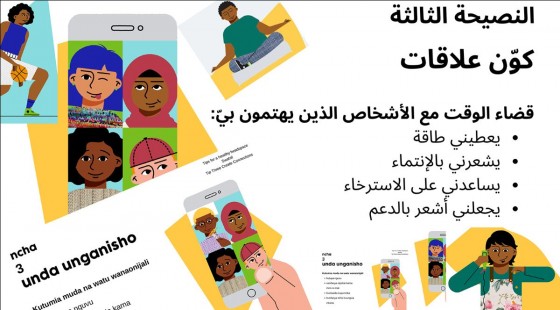
Multicultural Communities Council of the Illawarra and headspace Wollongong have worked with young people from the Arabic and Swahili speaking communities of the Illawarra on a set of evidence-based resources 'seven tips for a healthy headspace' to create culturally appropriate wellbeing resources in language and in a youth voice.
On June 7th 2021 the resources were launched and they are now available both in hardcopy and for download, see below.
The resources can be used as posters (print in A3), as worksheets with groups wanting to workshop wellbeing strategies or by individuals (print in A4), and used as display flyers in health and community services and other locations (print in A5).
Please contact headspace Wollongong on 02 42207660 if you have any queries. MCCI and headspace Wollongong want to thank the young people who worked with us on this project and shared their cultural knowledge and language skills with us to create the resources: Adolphine, Ziraje, Tresor, David, Mariam, Ola and Sabrin.
Seven tips for a healthy headspace summary
Tip 1 Get in to life
Tip 2 Learn skills for tough times
Tip 3 Create connections
Tip 4 Eat well
Tip 5 Stay active
Tip 6 Get enough sleep
Tip 7 Cut back on alcohol and other drugs
COVID-19 restrictions and changes to daily routines have had an impact on lives of young people across Australia. headspace Wollongong have a range of downloadable resources available for young people, their family and friends, and service providers who work across the Illawarra with young people. These resources provide helpful information and advice on coping in these challenging times.
7 Tips for a healthy headspace: Coronavirus editions.
2. learn skills for tough times
7. cut back on alcohol and other drugs
FactSheets.
Coping with the stress of Coronavirus
Balancing online school and working from home
Financial support for young people impacted during COVID-19
Adjusting back to normal routines.
Are you interested in fundraising for or making a donation to headspace Wollongong?
Your generous support helps us to provide vital mental health and wellbeing support, information and services to young people and their families across the Illawarra.
Set up your own fundraising page:
Are you setting a personal challenge, entering a fundraising event or celebrating a special occasion?
If you would like to fundraise for headspace Wollongong, head to GoFundraise to set up your fundraising page.
Donate online:
Donate online using the secure platform of GiveNow.
Donate by direct deposit:
Account Name: Grand Pacific Health
Account number: 606303831
BSB: 082916
Bank: National Australia Bank
Please use a reference code of 66003 with your deposit so the funds are allocated correctly.
Donate by cheque:
Cheques can be made out to Grand Pacific Health and mailed to Attn: Finance, Grand Pacific Health, PO Box 1198, South Coast MC NSW 2521.
Please email info@headspacewollongong.org.au to advise us of your contact details when making a donation by direct deposit or cheque, and include hsWgong or 66003 as a message/reference with your donation.
Thank you for your support!
Youth Reference Group (YRG)
The Youth Reference Group (YRG) guides what we do here at headspace Wollongong, making sure we're on the right track to provide a service that is relevant to young people in the Illawarra.
Our YRG is made up of enthusiastic young people aged 16-25 years who share their opinions and have their say on what we do and how we do it.
The role of the YRG is varied and includes a range of duties, from participating in regular meetings and online communications, to helping to plan youth events, representing headspace Wollongong at community events and raising awareness of mental health and wellbeing in our community. If you would like to receive more information about volunteering with the Youth Reference Group, fill out an expression of interest here
Applications for the Youth Reference Group open in November at the end of each year, for the following year's group. If you would like to be notified when our YRG applications open, please contact:
Community Engagement and Youth Participation
headspace Wollongong
ph 02 4220 7660
or email gdeane-smith@gph.org.au
Family and Friends
The Family and Friends group is a diverse group of volunteers that provide consultation and guidance to headspace staff around the engagement of family members and friends of young people in the community. Along with the Youth Reference Group (YRG) Friends and Family assist with guiding the direction of headspace Wollongong , particularly around increasing the engagement of family and friends in the community and providing better support to carers of young people accessing headspace services.
The aim of Friends and Family is to give those that support and care for young people in the community the opportunity to provide feedback and input into the strategic direction of headspace Wollongong. Friends and Family will be involved in the development of projects in the local community and within headspace to make our service more family friendly.
For more information or to express your interest contact:
headspace Wollongong
email: info@headspacewollongong.org.au
or phone 02 4220 7660
Please contact our centre on ph 02 4220 7660, or email us at info@headspacewollongong.org.au and share your thoughts with us. We love to hear from you.

